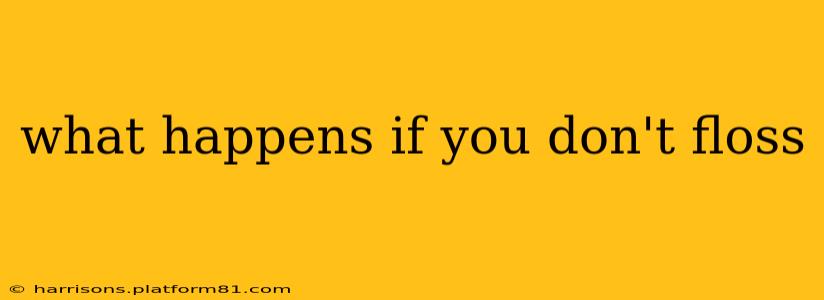What Happens If You Don't Floss? The Consequences of Skipping Dental Flossing
Many people know brushing is crucial for oral hygiene, but flossing often gets overlooked. However, neglecting to floss regularly can have significant consequences for your oral health, impacting more than just your smile. Let's explore what happens if you don't floss and why incorporating this simple habit into your daily routine is so important.
What is the Purpose of Flossing?
Before diving into the consequences, let's clarify the role of flossing. Brushing effectively cleans the surfaces of your teeth, but it can't reach the tight spaces between them. These interdental areas are breeding grounds for plaque, a sticky film of bacteria that contributes to various oral health problems. Flossing physically removes this plaque, preventing issues before they arise.
Gum Disease (Gingivitis and Periodontitis): A Major Consequence of Not Flossing
One of the most serious consequences of neglecting flossing is the development of gum disease. Plaque buildup between your teeth irritates the gums, leading to gingivitis, the earliest stage of gum disease. Gingivitis is characterized by red, swollen, and bleeding gums. If left untreated, it can progress to periodontitis, a more severe form of gum disease that damages the tissues and bone supporting your teeth. Periodontitis can lead to tooth loss if not addressed promptly by a dentist.
Cavities (Dental Caries): Hidden Plaque Leads to Hidden Decay
Food particles and plaque trapped between your teeth provide an ideal environment for bacteria to thrive. These bacteria produce acids that erode tooth enamel, resulting in cavities. Flossing helps prevent this by removing food debris and plaque from these hard-to-reach areas, significantly reducing your risk of developing cavities.
Bad Breath (Halitosis): A Direct Result of Bacterial Buildup
Bacteria trapped between your teeth release volatile sulfur compounds, which are the primary cause of bad breath. While brushing helps, flossing is essential for reaching the areas where much of this odor-causing bacteria accumulates. Consistent flossing is a crucial component of fresh breath.
How Often Should I Floss?
The American Dental Association recommends flossing at least once a day. The best time to floss is before brushing, as this allows you to remove the loosened food particles and plaque more effectively.
What are the Different Types of Floss?
There are various types of floss available, including waxed, unwaxed, flavored, and dental tape. Experiment to find the type that best suits your needs and preferences. If you find traditional flossing difficult, consider using interdental brushes, which are small brushes designed to clean between teeth.
Is Flossing Really Necessary If I Brush Thoroughly?
While brushing is essential, it's simply not enough to clean the areas between your teeth. Even with the most meticulous brushing technique, plaque and food particles will remain trapped, leading to the problems outlined above. Flossing is a critical supplement to brushing for optimal oral health.
Can Flossing Damage My Gums?
If done incorrectly, flossing can indeed irritate your gums. However, with the proper technique, flossing is safe and beneficial. Use gentle, C-shaped strokes, and avoid snapping the floss against your gums. If you experience persistent bleeding or gum irritation, consult your dentist.
In conclusion, neglecting to floss has far-reaching consequences for your oral health. The small amount of time it takes to floss daily significantly reduces your risk of gum disease, cavities, and bad breath. Make flossing a non-negotiable part of your daily routine for a healthier, happier smile. Remember to consult your dentist for personalized advice and regular check-ups.
